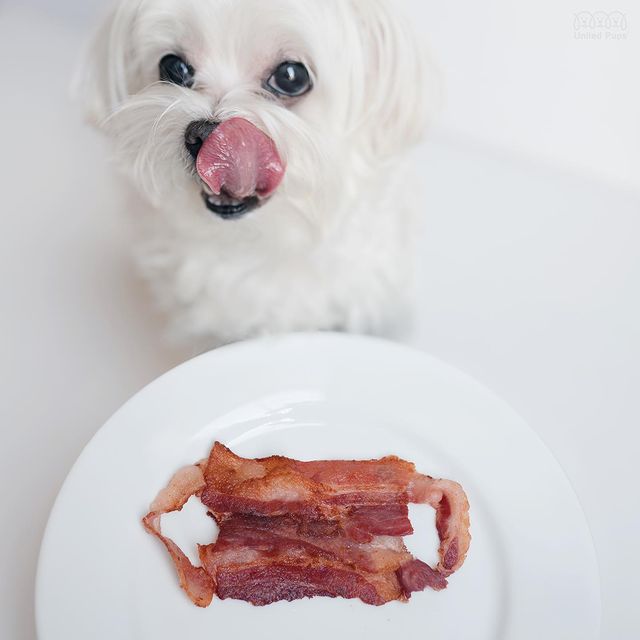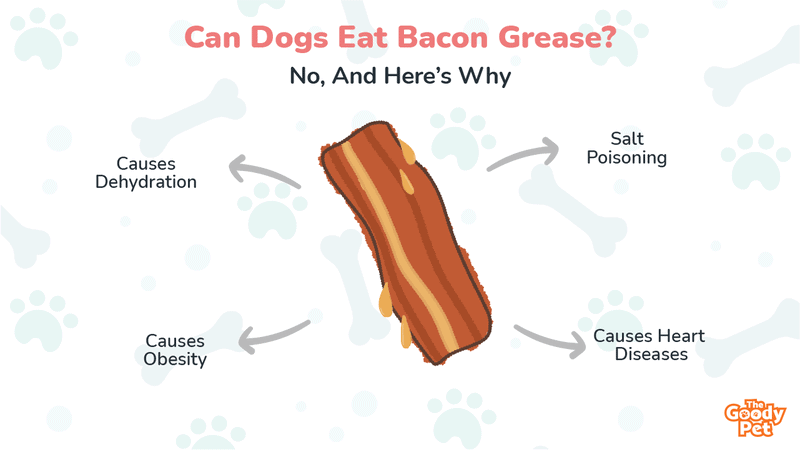I once read an article some time ago about how spreading bacon grease on a dog’s food could help it develop a shiny coat. Also, there’ve been rumors that bacon grease could speed up the fattening of a lean dog. And, at first thought, it does sound logical that the oily fat from bacon grease could bring a skinny, caricature-looking dog to the size of a well-fed, robust English mutt. But the question worth asking is: is bacon grease really safe for dogs?
The truth is, while bacon grease may prove helpful to dogs in a few ways, like rapid weight gain for medical reasons, many ugly repercussions arise from its consumption, such as pancreatitis and obesity. Thus, this brings us to the conclusion that dogs must stay off bacon grease.
Not surprisingly, because of an emotional mix of care and subtle desperation, many dog parents may still be tempted to give bacon grease to their dear Fidos. So, as you read on, you’ll find out why bacon grease is dangerous to dogs, whether bacon grease can help fatten up dogs or make their coats shinier, what to do when dogs consume bacon grease, as well as the safer alternatives to bacon grease that dogs can eat.
Why Is Bacon Grease Dangerous For Dogs?
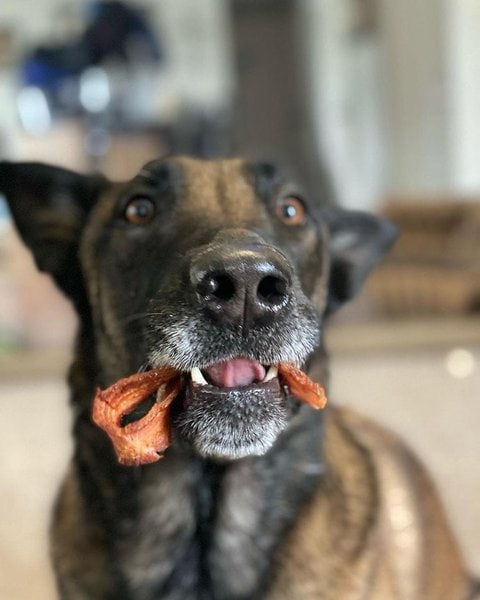
Just from observing the heavy, sludgy nature of bacon grease, you should be able to guess that such a substance wouldn’t help your pooch very much. That aside, there are several reasons why bacon grease does more harm than good for dogs, and these are some of them:
Indigestion And Gastrointestinal Discomfort
Leave the grease that seeps out of heated bacon to cool, and you get a congealed, paste-like sludge sitting in the pan, a perfect example of how bacon grease stuffs your beloved four-legged’s system.
The grease’s thickness coupled with the weakness of your four-legged companion’s digestive system to effectively absorb fatty human food slows down the digestion process and causes gastrointestinal discomfort.
This slow decomposition makes dogs restless, uncomfortable and also affects other organs around the stomach.
Inflammation Of The Pancreas
Bacon grease, because of its thick nature, over tasks the pancreas and causes it to swell. The pancreas is the principal organ responsible for breaking down excess fat, sugar, and starch by releasing enzymes contained in the pancreatic juice.
The problem is that bacon grease, when ingested, takes a long time to be broken down. Hence the pancreas overworks yet finds it difficult to remove the excess fat from your dog’s system.
Consequently, once there’s an accumulation of grease in a dog’s system, it starts to affect the pancreas’ proper function, making it swell and causing severe discomfort for your canine pal.
Since the pancreas resides near the stomach, the inflammation affects the stomach muscles, hindering proper digestion. But, of course, that’s without mentioning the constriction of the intestines and other organs surrounding the abdomen.
Note that pancreatitis, the inflammation of the pancreas, is more prominent in pups since their digestive systems are weaker than their adult counterparts.
Unfortunately, pancreatitis surgery costs a lot and involves partial removal of damaged pancreas tissue, leaving your furry buddy destabilized for life.
Dehydration And Salt Poisoning
The reason why bacon grease suffices as a significant cooking ingredient is partly because of its salty taste. And as you might know, salt is a high-degree threat to dogs.
For clarity, the high sodium content in bacon grease gets into the bloodstream of a healthy dog and causes the shrinkage of cells. Cells primarily shrink in an attempt to force out the excess salty moisture and to rebalance the salt-to-water ratio in a dog’s body.
The shrinkage causes dehydration which induces extreme thirst, forcing your dear Fido to lap up excess water out of raw, uncontrolled survival instinct. But, unfortunately, the excess water in the body now becomes a problem, causing stomach bloating and, afterward, discomfort and vomiting.
But what’s worse is the possibility of salt toxicity which happens when the salt attack on cells starts and your canine pal doesn’t have enough water to drink. The sodium content in the bacon grease, having shrunk brain cells, could cause seizures, muscle spasms, and, in severe cases, death in dogs.
Heart Diseases
The fatty component in bacon grease contains a decent amount of cholesterol which can accumulate in your dear Fido’s system and contribute to the occurrence of many heart-related ailments.
What happens is that cholesterol builds up as plaque which obstructs blood-carrying vessels called arteries. Eventually, your pooch’s heart doesn’t get as much blood supply from the brain as before and starts to function poorly. Likewise, brain function diminishes since oxygenated blood can’t leave the heart and get to the brain.
The continued occurrence of restricted blood flow to and from the heart eventually leads to cardiac arrest, especially when your four-legged body exercises and demands more blood and oxygen from the heart.
Obesity
If there’s one dog-related disease that constantly worries many dog owners, it’s obesity. And frankly, allowing your canine to eat bacon grease would only worsen matters.
The thing about obesity is that it attracts a host of other corollary diseases such as inflammation, lethargy, CAD— coronary heart disease, hip dysplasia, and many others.
In general, the obesity-inducing culprit in bacon grease is the high saturated fat content. And although the saturated fat in bacon grease has been proven to be okay for humans, it constitutes severe health risks for dogs.
Can Bacon Grease Fatten Up A Lean Dog?
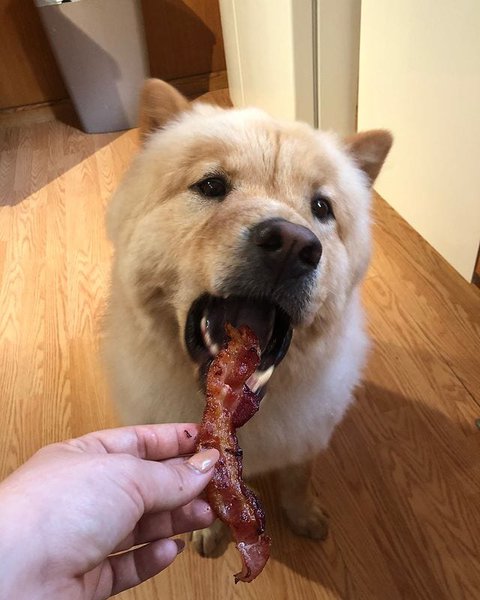
Yes, bacon grease can fatten up a lean dog, but there could be severe health implications.
Granted, many dog owners, especially those with newly adopted skinny rescue dogs, may feel the overwhelming urge to fatten up their beloved furry pal with bacon grease, and that’s understandable.
But even when the saturated fat in bacon grease causes a dog to gain weight fast, the high sodium content can cause seizures and cardiac arrest, which far outweigh the benefits when looked at deeply.
This method of fattening is somewhat related to the term known as “dirty bulking.” And as the name implies, the fattening process is harmful and doesn’t always end well for your doggie.
Instead of feeding your canine with harmful grease, there are other healthy ways to increase a dog’s weight and still enrich its organs with vital nutrients in the long run.
Can Bacon Grease Make A Dog’s Coat Shinier?
While it’s true that dogs shouldn’t eat bacon grease because of the high sodium content, there’s no denying that the grease can help make dogs’ coats shinier. This is because the overabundance of saturated fats gets into your pooch’s system and helps supply the sebaceous glands with the oily components needed to make hair follicles soft and lustrous.
Understandably, those folks who feed their dogs with bacon grease mostly do so to treat hair loss and make their canine pal’s sprout fuller and shinier furs. Nevertheless, there are other ways to help a dog grow rich, smooth, gleaming hair than feeding it a potentially harmful substance like bacon grease.
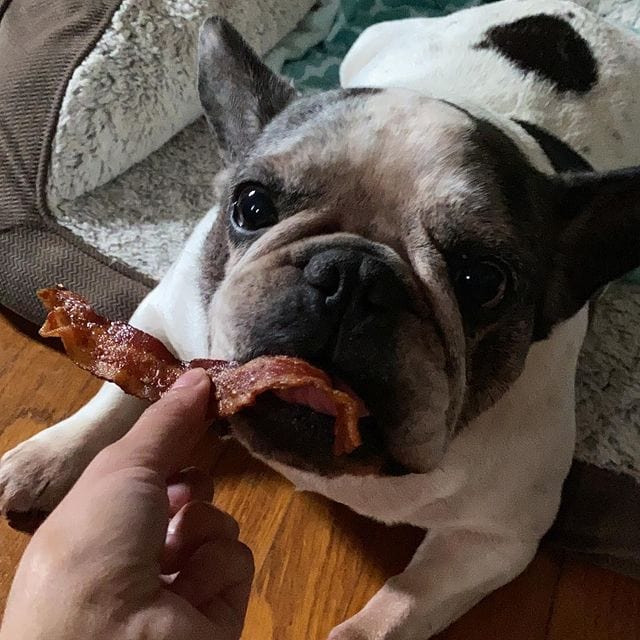
What To Do If My Dog Eats Bacon Grease?
Once you detect your pooch has ingested bacon grease, the first thing to do is withdraw the harmful substance so that there’s no access to it anymore.
Since the sodium content in bacon grease is high, depending on the amount your canine has consumed, it might thirst greatly, so you’d have to provide it with water.
However, do ensure not to feed your dog too much water, as this could be counterproductive and worsen the situation by inducing other life-threatening symptoms like bloating.
The next thing to do is to pay close observation to your four-legged buddy watching for any strange behaviors. Upon sighting anything funny, you should involve the vet straight away.
Furthermore, you’d have to use your discretion to determine how soon to visit the vet after your pooch ingests bacon grease, and that depends on the quantity consumed.
Lastly, remember that your doggie doesn’t necessarily have to eat bacon grease to be in harm’s way. Foods such as eggs and fries prepared with bacon grease are also as dangerous.
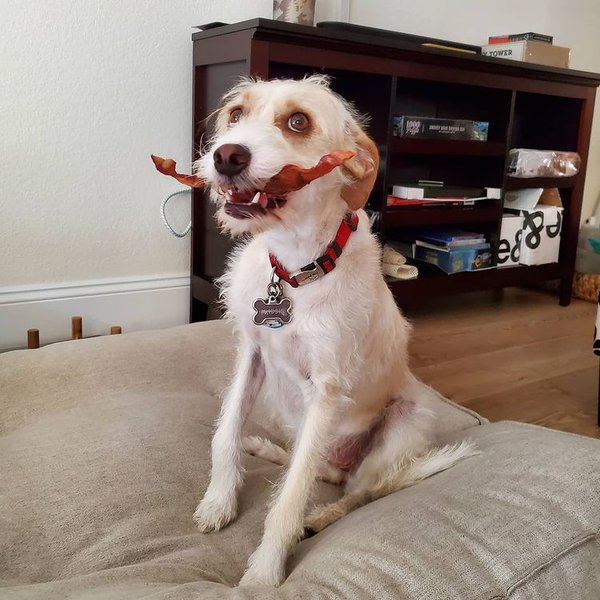
What Are Healthy Alternatives To Bacon Grease?
Instead of using bacon grease to increase your furry buddy’s weight, several healthier alternatives have relatively lower risks. Some of which are:
Chicken Broth
Chicken broth contains all the seeped-out goodness of chicken skin that could greatly enrich your furry buddy’s diet and supply it with the essential fatty acids it needs.
Also, the sweet aroma of chicken broth makes it a great meal topping for skinny dogs, spurring their desire to eat more, which helps them develop flesh faster.
Olive Oil
Olive oil contains low cholesterol and fat levels and serves as an excellent alternative to bacon grease.
Furthermore, the oil has anti-inflammatory properties and many other helpful nutrients to boost your dear Fido’s vitality.
Fish Oil
Apart from the tastiness and attractive smell, fish oil contains omega-3 fatty acids that aren’t often found in other fatty substances like bacon grease.
In addition, the many benefits of fish oil in dogs, such as improved eye vision and intellect, make them an excellent substitute for bacon grease.
